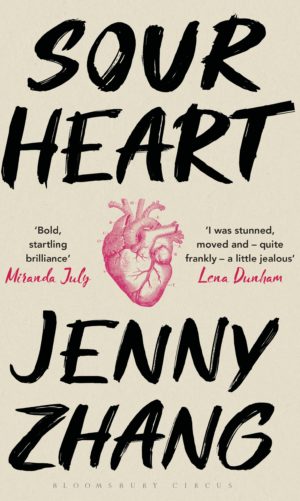You have no items in your cart. Want to get some nice things?
Go shopping “Back when my parents and I lived in Bushwick in a building sandwiched between a drug house and another drug house, the only difference being that the dangers in one house were also the users and so more unpredictable, and in the other the dealers were never the users and so more shrewd – back in those days, we lived in a one-bedroom apartment so subpar that we woke up with flattened cockroaches on our bed sheets, sometimes three or four stuck on our elbows, and once I found fourteen of them pressed to my calves, and there was no beauty in shaking then off, though we strove for grace, swinging our arms in the air as if we were ballerinas.”
“Back when my parents and I lived in Bushwick in a building sandwiched between a drug house and another drug house, the only difference being that the dangers in one house were also the users and so more unpredictable, and in the other the dealers were never the users and so more shrewd – back in those days, we lived in a one-bedroom apartment so subpar that we woke up with flattened cockroaches on our bed sheets, sometimes three or four stuck on our elbows, and once I found fourteen of them pressed to my calves, and there was no beauty in shaking then off, though we strove for grace, swinging our arms in the air as if we were ballerinas.”
If the anecdote about cockroaches that opens Sour Heart isn’t arresting enough, the one about living without a loo that follows it certainly will be. But the bold power of Jenny Zhang’s voice is immediately more impressive. Seven interlocking stories, all of them about children of migrants to New York from China, analyse the mechanics of closeness in families. The psychology of intimacy, and distance, amplifies the setting and circumstance of its characters.
The book begins with an introductory story, “We Love You Crispina”. The narrator paints a tableau of an apartment in Washington Heights with five mattresses on the floor, “all pushed up against each other” and occupied by five different migrant families. Characters from this opener crop up in later stories (for example, Guoqiang and Li Huiling are the protagonist’s parents in “Our Mothers Before Them”), weaving together a community of different experiences, known only partly or vaguely despite the characters being physically thrown together in this apartment.
Christina – the hero of the title, nicknamed “Crispina” – is the only child of two migrants who have moved from Shanghai to New York. She particularly connects with her mother, with whom she shares her love of sour fruit. Her parents’ nickname for her, Sour Heart, provides the title. We also return to Crispina’s family in the final story.
Tremors of the Cultural Revolution shimmer through all its adult characters. But it is not until the third story – “Other Mothers Before Them” – that Zhang refers directly to it. In this story, set some 7,000-odd miles from New York and fifty years before the contemporary setting of Sour Heart, one family struggles to stay out of the gaze of the lynch mob. Naturally this story is the most vivid and violent. But the clarity with which Zhang has the protagonist identify and describe the dynamic at work in that family does nothing to take away from its power.
In spite of the strength and consistency of the collection, two stories stand out in particular brilliance.
“The Evolution of My Brother” recreates with intense sharpness the beauty and terror of sibling love. It opens with a run-of-the-mill memory: the protagonist babysitting her brother. They play with candles and when he scorches his hair, she encourages him to eat it. By the end, Zhang conjures the particular pain of growing up: that tearing feeling of realising you cannot stay in the bosom of your family forever.
And “Why Were They Throwing Bricks?” is another highlight. Instead of focusing on the experience of a child or family, the story focuses on the narrator’s grandmother – the woman sheltering her family from mob violence in the episode set in Shanghai, 1966.
Sometimes the writing feel a bit literal. Zhang, perhaps because of the weight of her material, tells rather than shows her stories – for example, the description of this grandmother’s psychological background is given by the young narrator’s exposition. Nevertheless, Zhang’s portrait of the older woman is stark and simple. The story zings with the love and pain the grandchildren feel even before they know what she’s been through.
The last of the stories, “You Fell into the River and I Saved You!”, tells the story of how a girl built a friendship with a cousin in China, told from the point of view of an adult narrator looking back (the only one in the collection). It concludes with a dream sequence in which she talks to dozens of relatives around the world. A clamour of voices reminds her of the claustrophobia of the flat, featured in the first story, with five mattresses on the floor. She wishes badly to be on her own. But when the others in the flat fall asleep, the narrator is faced with intense loneliness, and then guilt at having wished to be alone. In her loneliness she rehearses opening lines for phone calls to her wider family in Shanghai, over and over.
In a redemption story that mirrors the work of the collection as a whole, the narrator dreams that her parents shoulder her anxiety so she can “remember” herself.
Zhang writes: “It went on like that until my parents came looking for me, and without me having to ask, they would lie down next to me, sensing exactly the kind of exhaustion I was trying to outlive, and pet me and ask me questions that required no answer. How did we end up with such as sour girl? How did we get so lucky? they’d say, clearing away the frantic voices of who I thought I was supposed to be, and though I knew it wouldn’t last forever, I stayed between them until I remembered who I was again and no longer felt lonely.”
After years of marketing fiction about migration as exotic or outsiderly, publishers seem more willing to connect readers with a more nuanced account of immigration (The Good Immigrant, Ghana Must Go, We Need New Names, Americanah). Sour Heart rides the crest of this wave. The diversity of dynamics on display in this collection shows the author’s skill for producing original psychological portraits that are dignified, funny, tender and rich.
Sour Heart is published by Bloomsbury Circus.

About Ellie Broughton
Ellie Broughton (elliebroughton@gmail.com) is an arts writer and copywriter with experience writing for The Guardian and Guardian Labs, The Huffington Post, The Independent and Vice. She is also the essays reader for Litro.
- Web |
- More Posts(6)




